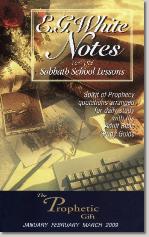|
||||||||||||||||||||
Commentary on "The Authority of the Prophets"
Day 2: Sunday, February 15, 2009
This lesson introduces Moses as the mouthpiece of God and draws a parallel between Moses’ hesitation to accept God’s call and Ellen White’s similar hesitation. The relationship between Moses and Aaron in which Moses was going to be God for Aaron and Aaron was going to be the mouthpiece is the human example of the relationship between God and his prophets, his mouthpieces.
Problems
The current lesson is trying to highlight similarities between Moses’ call and Ellen White’s call to the office of a prophet, found in the initial negative reaction of both of them to the call. Veiled in the argument is that both ministries (Moses’ and Ellen’s) carry the marks of supernaturalism because neither Moses nor Ellen had the natural abilities or the inclination to become involved in this work. Something else, something unnatural, supernatural, must account for their ministry, the implied logic goes.
Moses was not the type of personality who spoke fluently in public, his natural inclinations leaning toward life in isolation, shepherding the flocks of his father-in-law Jethro (Exodus 3:1). He did not seek public affirmation; he didn’t love the applause and praise accompanying this work; after all, he was not at all qualified for such public activity since he had problems speaking (Exodus 4:10). His life as the leader of his people’s exodus was contrary to his natural inclinations and abilities. Without God’s active intervention and continual sustenance, Moses would never had been the biblical prophet and hero the world knows today.
A similar argument is used regarding Ellen White: she had not sought a public career; she was young, timid, in bad health, and not expected to lie long. Indirectly it is argued that, because of because of the similarities between her calling and Moses’ calling, her evolution into a powerful personality is attributed to God’s powerful and transforming intervention in her life.
What is missing in this picture is the disturbing fact that she was not the first on the list of God’s preferences in choosing a prophet. Hazen Foss was previously chosen by God, and he refused the call to become a prophet—and, as Foss related, God had chosen instead of him the “weakest of the weak”, Ellen White, leaving Foss with no hope for eternal life. Contrary to Foss’ portrayal of God, the Bible presents a God who knows what he’s doing in calling even reluctant prophets to the ministry, who, in spite of their unfitness or opposition to their call, had not failed in their mission. There is simply no case in which God, after being refused by man, had chosen somebody else. For example, Jonah, even if he did everything to run from his duty of delivering the message, had nevertheless ended up shouting God’s warnings to the people of Nineva, and even after that he still tried to argue with God to justify his diversion to Tarshish (Jonah 4:2), proving that he had not changed his mind too much regarding his initial refusal to take the call. If God can still accomplish his purposes with such a reluctant and rebellious prophet, if he was not constrained to replace Jonah with somebody else in order to fulfill his plans, Ellen’s calling looks like God just failed to do what he successfully accomplished in the past.
Summary
- Ellen White is not like Moses, because Moses was never God’s second best choice, selected when God’s first choice fails because of people’s stubbornness. The dissimilarities between Ellen White’s call and Moses bring in question the nature of God’s sovereign power, foreknowledge and wisdom in electing people for the prophetic office. It brings into question whether God is truly the God depicted in the Bible or a God of their own imagination.
Copyright 2009 BibleStudiesForAdventists.com. All rights reserved. Revised February 14, 2009. This website is published by Life Assurance Ministries, Glendale, Arizona, USA, the publisher of Proclamation! Magazine. Contact email: BibleStudiesForAdventists@gmail.com.


The Sabbath School Bible Study Guide and the corresponding E.G. White Notes are published by Pacific Press Publishing Association, which is owned and operated by the Seventh-day Adventist church. The current quarter's editions are pictured above.
Official Adventist Resources
Standard Edition Study Guide Week 8
Teacher's Edition Study Guide Week 8
Easy Reading Edition Study Guide Week 8
Search the Complete Published Ellen G. White Writings
